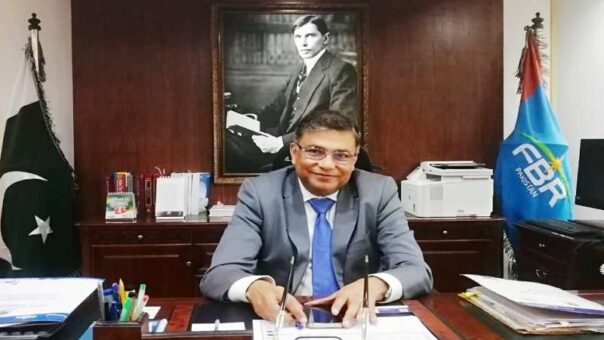The Federal Board of Revenue (FBR) has recently appointed Sajidullah Siddiqui, a senior BS-21 officer, as the Chief Commissioner Inland Revenue of Large Taxpayers Office (LTO) Karachi.
The officer assumed the charge on April 13, 2023. The post of Chief Commissioner of the LTO Karachi is an important position as the unit is known as the mini FBR and the revenue collection at the national level is dependent on the collection of the LTO Karachi.
The unit contributed around 26 percent tax collection at national level in the last fiscal year. The unit collected Rs1.595 trillion during fiscal year 2021-2022 against the total collection of Rs6.148 trillion at the national level.
In the current fiscal year the national tax agency is facing revenue shortfall due to multiple reasons including economic slowdown. However, Sajidullah Siddiqui, while talking to PkRevenue.com vowed to achieve the revenue collection target for the fiscal year 2022-2023.
Siddiqui highlighted the importance of the LTO Karachi stating that the unit is a specialized tax collection unit of the FBR
It was established in 2002, with the aim of facilitating the tax compliance of large taxpayers and improving tax revenues.
The LTO Karachi is responsible for the tax collection of large taxpayers in the province of Sindh and Balochistan, which includes multinational corporations, banks, telecom companies, and other large enterprises.
The unit has jurisdiction over taxpayers whose annual turnover exceeds Rs50 million or whose income tax liability is more than Rs5 million.
The LTO Karachi has a dedicated team of tax officials who provide specialized services to the large taxpayers. These services include assistance in the filing of tax returns, tax audits, and dispute resolution. The unit has established a one-window operation to provide a seamless tax collection process for the large taxpayers.
One of the key features of the LTO Karachi is its focus on technology-driven tax collection. The unit has implemented various initiatives to facilitate taxpayers in filing their tax returns and paying their taxes online. The LTO Karachi has also launched a mobile app for taxpayers, which allows them to track their tax refunds and access other tax-related information.
The LTO Karachi still faces challenges in improving tax compliance and reducing tax evasion. One of the main challenges is the informal economy, which makes it difficult for tax officials to trace taxable income. The unit is taking various measures to address this challenge, including establishing a data exchange mechanism with other government agencies and strengthening its intelligence network.
The appointment of Sajidullah Siddiqui as Chief Commissioner Inland Revenue of Large Taxpayers Office Karachi is expected to further strengthen the unit’s efforts in improving tax compliance and revenue collection. The unit’s focus on technology-driven tax collection, specialized services, and robust enforcement mechanism is crucial in achieving the national tax revenue targets.
Continuous efforts and innovation are required to address the challenges faced by the unit and to improve tax compliance in the country.
In conclusion, the Large Taxpayers Unit Karachi is a specialized tax collection unit that plays a crucial role in improving tax compliance and revenue collection in Pakistan. The unit’s focus on technology-driven tax collection, specialized services, and a robust enforcement mechanism has resulted in significant success in tax collection.
However, the unit still faces challenges in reducing tax evasion and improving tax compliance, which requires continuous efforts and innovation.
